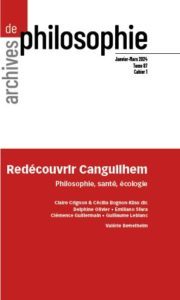 Tome 87, issue 1, January-March 2024
Tome 87, issue 1, January-March 2024
Rediscovering Canguilhem. Philosophy, ecology, & health
 Claire Crignon &Cécilia Bognon-Küss, Rediscovering Canguilhem. Philosophy, ecology, & health. Foreword
Claire Crignon &Cécilia Bognon-Küss, Rediscovering Canguilhem. Philosophy, ecology, & health. Foreword
Delphine Olivier, The contemporary rehabilitation of Canguilhem as a philosopher: A context of dispute
Recent studies have repeatedly emphasized the philosophical nature of Georges Canguilhem’s work. Our acknowledgment would be quite new, and delayed by a misconception of his work, which had been perceived as belonging to the fields of history of science or epistemology. But how did Canguilhem’s philosophy come to be forgotten? This surprising claim cannot be understood without taking into account a debate regarding the definition of the philosophy of science.
Emiliano Sfara,
Key concepts in contemporary ecology: Technique, milieu, and medicine
Little known until today, the two texts written by Georges Canguilhem on ecology are brought together in the fifth volume of his Complete Works. In Canguilhem’s view, the subject of ecology is intrinsically linked to the concepts of technique and milieu. Hence these questions: Should human beings abandon techniques to restore a presumed balance with nature, or is it instead necessary to prioritize their needs over economic interests?
Clémence Guillermain, Aging, in the light of biological philosophy
With only a few exceptions, the biological philosophy of G. Canguilhem never directly addresses the question of aging. But his reflections on health and disease, the normal and the normative, and more generally on the living, constitute, as a whole, a relevant theoretical framework for apprehending this phenomenon. We offer an example to show how Canguilhem’s reflections open up a space for dialogue between philosophical reflection and the contemporary biology of aging.
Guillaume Le Blanc, The link between concrescence and transition and its ontological significance
Canguilhem’s reflections are invaluable, for they emphasize that there is no such thing as a science of health, but only a knowledge of pathologies. Health is first and foremost a singular existential evaluation that comes from the ordeal of illness.Two meanings of health therefore come into conflict, running through the various analyses in the Essay on some problems concerning the normal and the pathological: health as abuse and health as regulation and the challenge for a philosophy of life is to articulate them.
Pierpaolo Cesaroni, La vita dei concetti. Hegel, Bachelard, Canguilhem (par Francesco Callegaro)
* * *
Valérie Bettelheim, The animal issue and its challenges: A Neoplatonic perspective
In our century, the animal question must be considered from a deconstructivist perspective, which, however, coexists with the persistence of an ontological discrimination against animals. However, Plotinus’s thought can shed light here, suggesting a new paradigm capable of reframing animal difference: linking ethics to ontology, Plotinus proposes that humans adopt an approach of « laisser-être » [let be] toward animals, understood as a different form of the living being whose protection it behooves us to ensure.
